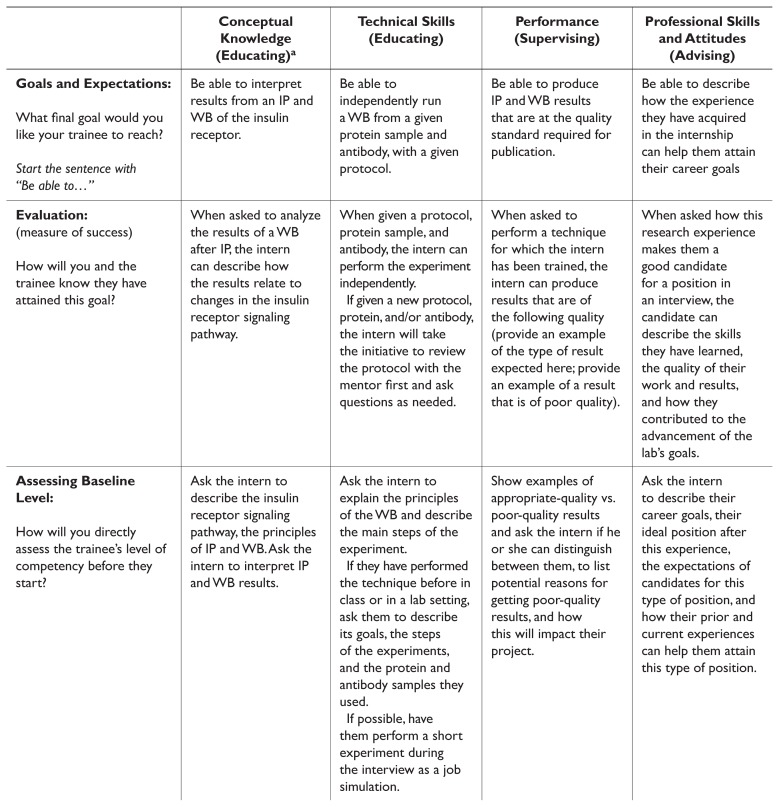TABLE 3.
Examples of backward design applied to the three roles of a research mentor, in a scenario where the trainee is an undergraduate or community college intern.
| Conceptual Knowledge (Educating)a | Technical Skills (Educating) | Performance (Supervising) | Professional Skills and Attitudes (Advising) | |
|---|---|---|---|---|
|
Goals and Expectations: What final goal would you like your trainee to reach? Start the sentence with “Be able to…” |
Be able to interpret results from an IP and WB of the insulin receptor. | Be able to independently run a WB from a given protein sample and antibody, with a given protocol. | Be able to produce IP and WB results that are at the quality standard required for publication. | Be able to describe how the experience they have acquired in the internship can help them attain their career goals |
|
Evaluation: (measure of success) How will you and the trainee know they have attained this goal? |
When asked to analyze the results of a WB after IP, the intern can describe how the results relate to changes in the insulin receptor signaling pathway. | When given a protocol, protein sample, and antibody, the intern can perform the experiment independently. If given a new protocol, protein, and/or antibody, the intern will take the initiative to review the protocol with the mentor first and ask questions as needed. |
When asked to perform a technique for which the intern has been trained, the intern can produce results that are of the following quality (provide an example of the type of result expected here; provide an example of a result that is of poor quality). | When asked how this research experience makes them a good candidate for a position in an interview, the candidate can describe the skills they have learned, the quality of their work and results, and how they contributed to the advancement of the lab’s goals. |
|
Assessing Baseline Level: How will you directly assess the trainee’s level of competency before they start? |
Ask the intern to describe the insulin receptor signaling pathway, the principles of IP and WB. Ask the intern to interpret IP and WB results. | Ask the intern to explain the principles of the WB and describe the main steps of the experiment. If they have performed the technique before in class or in a lab setting, ask them to describe its goals, the steps of the experiments, and the protein and antibody samples they used. If possible, have them perform a short experiment during the interview as a job simulation. |
Show examples of appropriate-quality vs. poor-quality results and ask the intern if he or she can distinguish between them, to list potential reasons for getting poor-quality results, and how this will impact their project. | Ask the intern to describe their career goals, their ideal position after this experience, the expectations of candidates for this type of position, and how their prior and current experiences can help them attain this type of position. |
|
Teaching Strategy and Support: What will the mentor do to help the trainee reach the goals and expectations from their baseline level? |
Tailor teaching to the intern’s current knowledge and preferred learning medium and current level:
|
Tailor training to the intern’s current skills level:
|
The mentor and intern will regularly meet and discuss the results obtained by the intern and describe the difference between quality vs. poor results. The mentor will go over possible reasons for getting poor results and the impact on the project when results are poor. | Tailor mentoring to the intern’s baseline level:
|
IP, immunoprecipitation assay; WB, Western blot assay.

